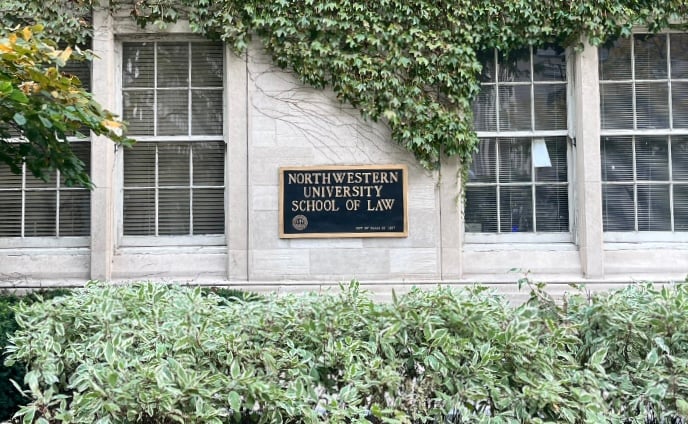Northwestern’s Pritzker School of Law hosted two political experts for a panel Thursday on the 2024 presidential election and the country’s political climate.
The event, titled “The Knox Conversations: America, 2024, and a Political Reckoning?” was part of Knox Conversations, a speaker series created by the University as a space to facilitate public discourse and foster healthy political discussions.
The bipartisan panel was made up of Paul Begala, a political contributor for CNN and former Democratic strategist, and Michael Steele, former lieutenant governor of Maryland and ex-chairman of the Republican National Committee. Pritzker Prof. Jason DeSanto moderated the discussion.
The event welcomed approximately 90 in-person attendees, with an additional option to attend virtually.
Following welcome remarks from Pritzker Dean Hari Osofsky, panelists Steele and Begala spoke about their start in politics.
Steele said he initially planned to join the Augustinian Order but decided that the public sphere was a better place to serve his community.
Begala said that through participating in student government throughout high school and college, he discovered a passion for making a difference in people’s lives and creating lasting change.
Panelists were provided an opportunity to answer audience questions submitted before the panel.
Asked for his thoughts on a third party, Steele said he supports the idea of a third party and believes in ranked choice voting and the president being elected by the popular vote.
Begala said he opposes a third party because he believes it would “empower the fringes” and that the Democratic Party needed to shift more to the center.
DeSanto asked both panelists what their predictions for the 2024 election were and what people could do to take action.
Begala encouraged the audience to vote, volunteer and participate in peer-to-peer organizing. He told attendees to step outside of their comfort zones and see how the other side thinks, emphasizing the importance of removing themselves from social media.
“Get off of social media,” Begala said. “It is incompatible with democracy.”
Steele said people should vote for the country they want to live in and for a government they feel comfortable having discussions with their kids about.
DeSanto also asked the panelists about their thoughts on the current political climate, mentioning that 65% of voters felt exhausted when thinking about politics, according to a 2023 study done by Pew Research Center. This exhaustion comes at a time when recent elections have had the highest voter turnout rates.
Begala said voting exhaustion can be explained by campaigns claiming they are more virtuous than their opponents. Ads and campaigns have switched from “‘I’m right, you’re wrong” to “I’m good, you’re evil,’” he said.
Both panelists agreed that increased voter turnout occurred because people were more agitated. Steele said voter anger also leads to increased support for campaign funds.
“Your anger has value to the party,” Steele said. “The more pissed you are, the more you pay.”
Email: marissafernandez2028@u.northwestern.edu
Related Stories:
— From Evanston to Capitol Hill: Here are some Wildcats in U.S. politics
— NU Votes registers hundreds of students to vote ahead of fall election
— Northwestern hosts panel of experts after Friday SCOTUS decision







